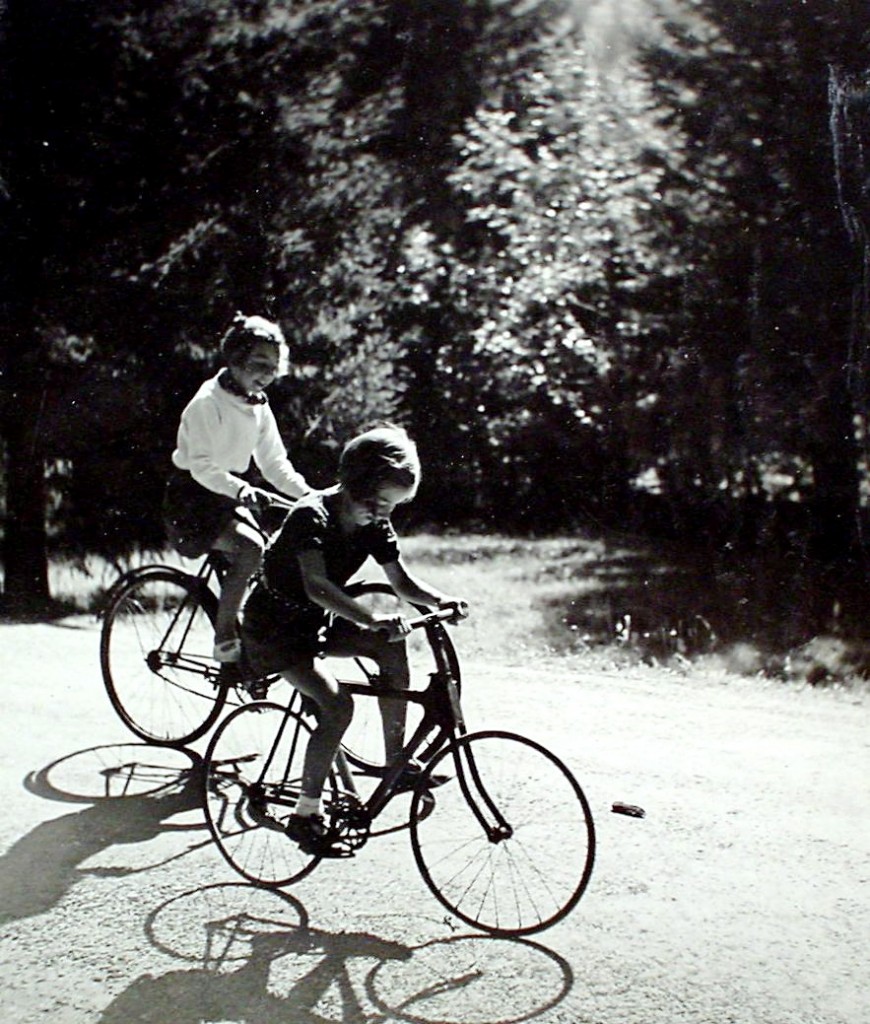
Moodie (smaller child) and her older sister Genevieve riding bikes in Chamonix, sometime during World War II.
BY WHITNEY EULICH
Moodie was 12 years old, when Germany invaded France. As World War II engulfed Europe, her father sent Moodie and her three sisters and mother to live in the family’s summer home in Chamonix, near the Swiss border of France. He figured it would be safer there without any large industries or factories for the Germans or Italians to target. They spent three winters there while their father traveled back and forth from Paris where he worked as a silversmith and ceramicist.
Their home was tucked in a small valley beneath Mont Blanc, the highest mountain in the Alps. The mountain chalet wasn’t designed for winter living, and the women depended on a large white stove in the kitchen to keep the house heated. One night, Moodie recalled, the stove failed completely, and by the time they woke up the next morning the front staircase was covered with a cascade of ice, the result of a burst water pipe.
Moodie laughed as she remembered that morning, and the shrieking that filled the house as the girls slid down the steps on their bottoms. “Finally, it was a little excitement in our day,” she said.
Moodie’s mother tried to create a sense of normalcy for her daughters by inviting soldiers stationed nearby over for tea, or teaching the girls how to sew and knit. “I never really learned to cook,” Moodie said, “but there was no food anyway, so I didn’t realize how critical that was until I married.” They were going hungry in Chamonix, dining on turnips, rutabagas or an occasional potato. Her father published two books after the war about edible mushrooms and plants in the Alps region, based entirely on the research he conducted to feed his family.
The fall before Moodie returned to Paris, her neighbor Mathilde invited her over for a last minute cooking lesson. Mathilde’s mother had saved her sugar rations for six months and planned to use them to make marmalade to last her family through the approaching winter. Mathilde’s mother went to Argentiere, a small town outside of Chamonix, for the day, and Mathilde wanted to surprise her mom by cooking, jarring and storing the marmalade before she got back.
Moodie walked two miles to town, down a dirt path surrounded by derelict dairy farms and boarded-up chalets. When she arrived at Mathilde’s house, she knocked on the backdoor and waited, hearing something clatter to the floor inside. Mathilde, surrounded by pots of different shapes and sizes, opened the door, handed Moodie a red gingham apron, and put her to work.
Mathilde had spent the entire morning gathering blueberries from a field behind her house. She had Moodie wash them while she organized the rest of the cooking tools and ingredients. The radio crackled in the background, but the girls’ focus was on the Marmalade. Backs straight, and eyes on the blueberries, they crossed from the sink to the stove to pour bowls full of berries into the large pot.
The process, Moodie found, was quite simple. After bringing a bit of water and the layers of fruit to a boil, they began pouring in the small, brown paper packages of sugar. Mathilde went first, tipping her bag to a slight angle, and watching as the white sugar spilled into the silver pot. Moodie went next, pulling a small, white foot stool in front of the stove so she could watch the sugar dissolve into the dark blue bubbles upon contact.
The sugar-pouring process continued just as meticulously until a pile of empty brown bags decorated the kitchen floor. While the stove did its work, the girls sat with their backs leaning against the oven door, playing Tarot and occasionally rising to stir the simmering marmalade or just breath deeply into the pot, savoring the imminent reward of sweet blueberry jam.
An hour after pouring the last sack of sugar into the pot, Moodie went in for the first taste test. She blew furiously at the spoon before parting her lips, and it wasn’t until this moment that it occurred to her something could have gone wrong.
The marmalade was salty. Mixed in with the stockpiled sugar, a lone bag of salt made its way into the pot of marmalade. Mathilde’s surprise for her mother, months of stockpiled sugar and a winter’s supply of jam were ruined.
Mathilde collapsed to the floor, sobbing. Nauseous and stunned, Moodie, still clutching the wooden tasting spoon and wearing her apron, opened the back door and ran home.
Moodie may have been the one to ruin the jam—she’s not sure. But, she said, what made the moment so terrible was the feeling that nothing at that point in her life could go right. “Every story had a sad ending,” Moodie said, “most were more severe than this, but I was just becoming a young woman, and was aware for the first time that I had played a part…I contributed to the hardship.”